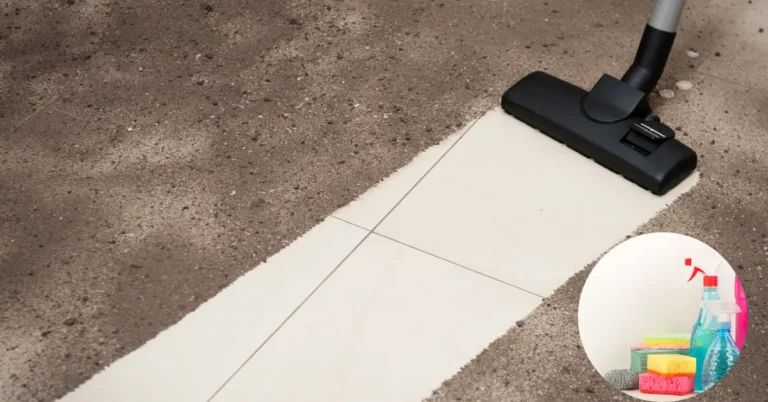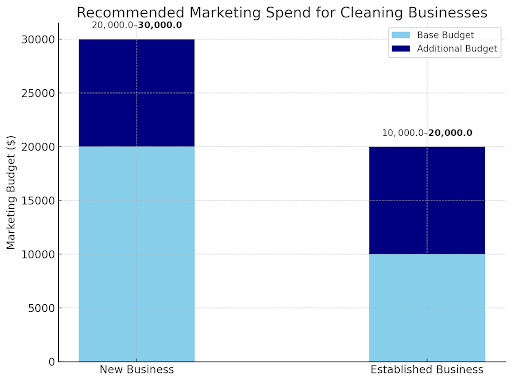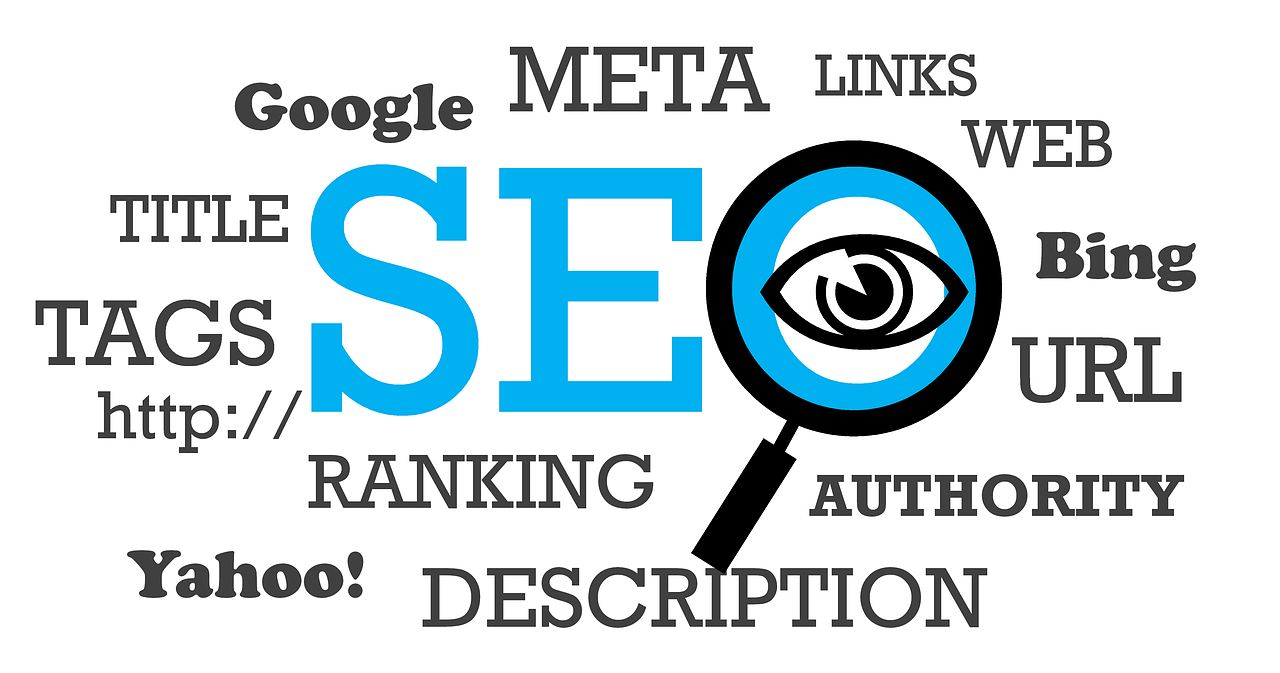Single Blog
How Much Should Cleaning Businesses Spend on Marketing?
September 6, 2025
Aslam miah

Running a cleaning business isn’t just about keeping homes and offices spotless. It’s also about making sure people know you exist. That’s where marketing comes in. But how much should a cleaning company actually spend?
Spend too little, and you risk being invisible to potential customers. Spend too much, and you eat into profits without seeing a real return.
But the safe marketing budget for a cleaning business is,
Cleaning businesses typically spend 5–10% of their total revenue on marketing. Most small businesses fall around 7–8%, while startups or companies in highly competitive markets may spend 15% or more to get noticed.
But when to spend more when less is important? Let’s break it down for you.
How Much Should Cleaning Businesses Spend on Marketing?
Marketing is the engine that drives new clients to your cleaning business. But the tricky part is knowing how much to invest without wasting money. The right budget depends on your business size, growth goals, and the channels you use.

A common rule of thumb is to spend 5–10% of your annual revenue on marketing for small to mid-sized cleaning businesses.
- New businesses: Aim for 10–15% of projected revenue. You’re building visibility, so it’s okay to invest more upfront.
- Established businesses: Around 5–10% of revenue is usually enough to maintain growth and stay competitive.
Example: If your cleaning company makes $200,000 per year, your marketing budget should be $10,000–$20,000 annually. New businesses might push it to $25,000–$30,000 to get traction.
The Marketing Budget Planning for The Cleaning Business Is Spent
You can spend $1000+ and still not get any result. But you can spend $100 and get a result worth $500. It’s all about planning. Here’s how we plan your budget at Capinity.
Paid Advertising — 25–30% of the Budget
Paid ads get immediate results. Google Ads, Local Services Ads (LSA), and Facebook campaigns put your cleaning business in front of people actively searching for services. Businesses using Google Local Services Ads see up to 50% more booked jobs compared to organic alone (Google).
Recommended spend: Small businesses often allocate $500–$1,500/month, depending on location and competition.
Reputation & Review Management — 10–15% of the Budget
Reviews are trust signals that make customers pick you over competitors. 87% of consumers won’t buy after seeing a negative review.
And 79% trust reviews as much as personal recommendations. Sending review requests, monitoring Google/Yelp/Facebook, and responding professionally.
Why: A high rating plus steady new reviews not only improves your ranking but also increases calls and bookings.
Social Media & Content — 10–15% of the Budget
Social media isn’t just for fun. It’s for visibility and trust-building. In fact 72% of consumers say they’ve discovered a local business through social media (HubSpot).
So, posting cleaning tips, before-and-after photos, short videos, and blogs that address local topics isn’t fun anymore. It works as seo nowadays.
Traditional Marketing — 5–10% of the Budget
Yes, some offline marketing still works. Flyers, door hangers, local sponsorships, and branded trucks can make a difference. Especially in neighborhoods with tight-knit communities.
Why: Complements your online efforts and helps you stand out locally.
Maximizing ROI from Your Marketing Spend
Spending money on marketing is one thing. You need to make sure every dollar brings back another client. For cleaning businesses, the goal isn’t just visibility.
It’s calls, bookings, and repeat clients. Here’s how to get the most bang for your marketing buck.
1. Track Everything That Matters
You can’t improve what you don’t measure. Track:
- Calls and booking requests: Use call tracking or unique phone numbers for ads and campaigns.
- Google Business Profile actions: clicks, direction requests, messages.
- Website conversions: contact form submissions, click-to-call clicks, quote requests.
- Paid ad performance: cost per lead, click-through rate, and conversion rate.
Stat: Businesses that actively track their marketing see up to 30% higher ROI than those that don’t (HubSpot).
2. Focus on Channels That Convert
Not all marketing channels bring equal results:
- Local SEO: People searching “cleaning service near me” are ready to book—this has the highest conversion rate.
- Google Local Services Ads: Paid leads here are usually high-intent and cost-effective.
- Review Management: Positive reviews increase trust and conversion, boosting ROI without extra ad spend.
Tip: Paid social media ads are great for awareness, but ROI is highest when paired with local search strategies.
3. Optimize Your Budget Regularly
Don’t set and forget your marketing budget. Review performance monthly:
- Reallocate funds from underperforming channels to the ones driving bookings.
- Test small campaigns before scaling spend.
- Adjust ad targeting based on neighborhoods, boroughs, or ZIP codes that bring the most clients.
Stat: Companies that adjust their marketing monthly instead of quarterly see 20–25% better lead generation efficiency.
4. Leverage Automation for Efficiency
Automation reduces wasted spend:
- Automate review requests via SMS/email.
- Utilize email campaigns to upsell recurring cleaning services.
- Schedule social media posts instead of paying for constant manual management.
This ensures your marketing keeps working even when your team is busy on jobs.
5. Prioritize Retention as Much as Acquisition
It’s cheaper to keep a client than to acquire a new one.
- Offer loyalty programs or discounts for repeat customers.
- Use email or text reminders for recurring cleanings.
- Encourage referrals and incentivize them.
Marketing Channels That Deliver the Best Results for Cleaning Companies
Not all marketing channels are created equal. For cleaning companies, the ultimate goal isn’t likes or clicks. It’s actual bookings. Focusing on channels that put your business in front of local customers ready to hire will maximize your results and ROI.
- Complete all fields and optimize service areas
- Collect and respond to reviews regularly
- Target specific boroughs or ZIP codes in NYC
- Highlight speed, reliability, and local expertise
- Track cost per booked job
- Send automated review requests after each job
- Respond to every review
Key takeaway: For cleaning companies, the best-performing channels are local SEO, Google ads/LSA, and reviews. These drive bookings directly. Social media and traditional marketing are complementary, supporting awareness, trust, and long-term visibility.
Frequently Asked Questions
Absolutely. 78% of local mobile searches lead to an offline purchase within 24 hours. A fully optimized Google Business Profile is often the #1 source of leads for cleaning
Very. 87% of consumers read online reviews before hiring a local business, and 79% trust them as much as personal recommendations. A strong review profile can boost both trust and rankings on Google.
Yes, but strategically. Allocate 5–10% of your marketing budget for local offline campaigns. They’re most effective in neighborhoods where people know and trust local businesses.
Running a cleaning business in New York isn’t easy. The competition is everywhere, and most customers don’t look past the first page of Google when searching for services.
But still some companies ask ‘ why local seo is crucial for cleaning companies in NY’ cause the whole seo thing is not their era. Well the thing is,
Local SEO helps cleaning companies in NY stand out in searches, attract nearby customers, and turn online visibility into real bookings.
How that work? Well, there are many local SEO strategies for cleaning companies. But in capinity we mainly follow a certain technique. So let’s talk about local seo for cleaning companies.
Final Thoughts
For cleaning businesses, marketing budgets usually fall between 5–10% of annual revenue. New businesses might go higher—up to 15%—to get traction fast.
The key is ROI, not just spending. Focus on channels that bring calls and bookings: local SEO, Google Ads, and reputation management. Traditional marketing and social media support your brand, but don’t expect them to fill your schedule alone.
"A good digital marketing strategy allows you to reach a wider audience with more personalized messages, helping your business grow in a smarter way."
– Neil Patel

